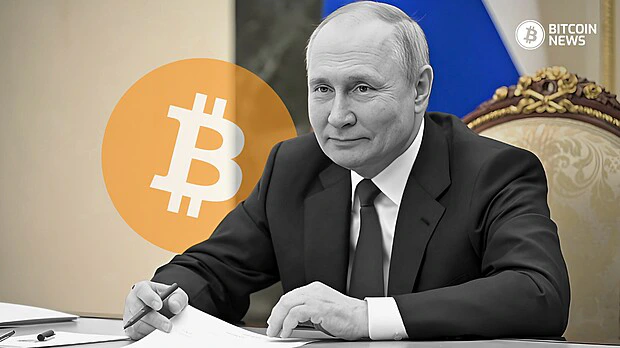In a significant turn of events, Russia has officially legalized mining of digital assets. This move, initiated by Russian President Vladimir Putin, represents a dramatic shift in the country’s approach to this new asset class, particularly Bitcoin.
The new law, which has been widely reported and analyzed, introduces a comprehensive legal framework that sets the stage for Russia to become a major player in the global Bitcoin market.
On August 8, 2024, President Putin signed a landmark law that legalizes Bitcoin mining in Russia. The new legislation represents a pivotal moment for Russia, marking its formal entry into the global digital economy.
The law not only recognizes Bitcoin mining as a legitimate economic activity but also establishes a clear regulatory framework for the industry.
As reported by Tass news agency, this law signifies a departure from Russia’s earlier stance on digital currencies, which was marked by caution and even outright opposition.
Just two years ago, the country was on the verge of banning Bitcoin altogether. However, the tides have turned, and Russia is now positioning itself as a key player in this space.
The new legislation introduces several important concepts and regulations that will govern the Bitcoin mining industry in Russia.
One of the most significant aspects of the law is that it restricts mining of digital assets to Russian legal entities and individual entrepreneurs who are registered with the government.
These entities and individuals will be included in a national register, giving them the official right to engage in mining activities.
However, the law also makes provisions for small-scale miners. Individuals who do not exceed certain energy consumption limits set by the Russian government can engage in Bitcoin mining without the need for formal registration.
This move allows small-scale miners to continue their activities without facing the same regulatory burdens as larger operations.
In addition to regulating who can mine Bitcoin, the law also introduces new concepts such as mining pools, mining infrastructure operators, and address identifiers.
These elements are crucial for the organization and operation of the mining industry within Russia, providing a structured approach to what has historically been a decentralized and often unregulated activity.
Another key provision of the law is its approach to the trading of digital financial assets.
The legislation permits the trading of foreign digital financial assets on Russian platforms. However, this comes with a significant caveat: the Bank of Russia retains the authority to ban the trading of certain assets if they are deemed a threat to the country’s financial stability.
This cautious approach to digital asset trading reflects the Russian government’s desire to balance innovation with the need to protect its financial system.
By allowing the Bank of Russia to intervene when necessary, the law aims to prevent any potential risks associated with the widespread adoption of digital currencies.
The timing of this legislation is particularly noteworthy. Russia has been under intense economic pressure due to Western sanctions imposed following its annexation of Crimea in 2014 and its invasion of Ukraine in 2022.
These sanctions have isolated Russia from the global financial system, making it difficult for the country to engage in international trade.
In this context, the legalization of Bitcoin mining and the broader acceptance of digital assets can be seen as a strategic move by Russia to circumvent these sanctions.
By embracing Bitcoin, Russia is exploring alternative forms of international trade settlement that do not rely on traditional financial systems like SWIFT, which have been used to impose sanctions on the country.
President Putin has been vocal about the need for Russia to “seize the moment” and establish a robust legal framework for digital assets.
This sentiment reflects a broader strategy to leverage Russia’s abundant energy resources for Bitcoin mining, potentially turning the country into a global hub for the industry.
Russia’s decision to legalize Bitcoin mining has significant implications not only for the country itself but also for the global Bitcoin market.
By formalizing the industry within its borders, Russia could become a major player in the global market, potentially competing with established mining hubs like the United States and China.
The law also opens the door for the development of new financial products in Russia, such as Bitcoin exchange-traded funds (ETFs).
Several countries, including the United States and Brazil, have already launched their own digital asset ETFs, and Russia could follow suit in the near future. This would further integrate Russia into the global Bitcoin market and attract more investment into the country’s digital economy.
However, there are also challenges and criticisms associated with Russia’s move. Some experts have expressed skepticism about the long-term viability of a Bitcoin-driven economy, particularly in light of the volatility and regulatory uncertainties surrounding digital assets.
This unpredictability poses risks for both the government and private sector participants in the mining industry.
For Russia, the legalization of Bitcoin mining represents a new economic era. The country is diversifying its resources and exploring digital assets as a means of fostering economic growth.
The new law also aligns with broader global trends towards the adoption of digital currencies. Countries around the world are increasingly recognizing the potential of Bitcoin to transform their economies.
Russia’s decision to legalize mining could inspire other nations to follow suit, further accelerating the global adoption of digital assets.
In the context of the BRICS bloc (Brazil, Russia, India, China, and South Africa), Russia’s move could also play a role in the ongoing efforts to reduce reliance on the U.S. dollar for international trade.
The BRICS countries have been exploring the idea of a unified digital currency for years, and Russia’s legalization of Bitcoin mining could contribute to these efforts.
Moreover, the environmental impact of Bitcoin mining is a growing concern globally. Mining operations require significant amounts of energy, and as Russia ramps up its mining activities, it will need to address the environmental implications of these operations.
Balancing economic growth with environmental sustainability will be a key challenge for Russia as it moves forward.
Related: List of Recent Studies on Bitcoin’s Net-Positive Environmental Impact
There are also legal and regulatory challenges to consider. The new law provides a basic framework for the industry, but there are still many details that need to be worked out.
For example, how will the government enforce the energy consumption limits for small-scale miners? What specific criteria will the Bank of Russia use to determine whether a digital asset poses a threat to financial stability?
These are questions that will need to be addressed as the law is implemented.










